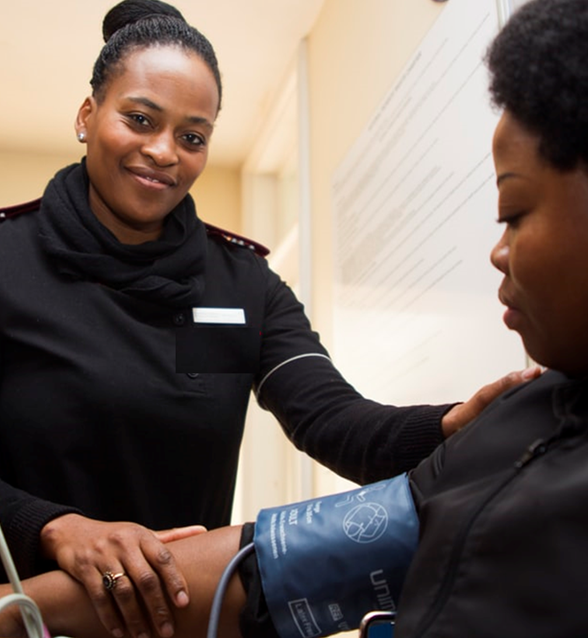Specialist Lupus Nurses
LUPUS UK is the only charity that provides funding for Specialist Lupus Nurses in NHS hospitals. We recognise the substantial benefit and positive impact such roles offer for people affected by lupus.
Specialist Lupus Nurses play a vital role in providing extraordinary care and support to people with lupus and their families.
The service they provide can significantly improve a patient’s overall well-being and help reduce medication non-adherence. Research by the Royal College of Nursing Rheumatology Nurse Forum shows that clinical nurse specialists not only enhance the whole patient experience, but also benefit the NHS, by freeing up consultant time and reducing the number of GP appointments.
LUPUS UK funds Specialist Lupus Nurses within the NHS and seeks a commitment that these posts will become permanently funded by the Hospital Trust at the end of the five-year funding period.
The service they provide can significantly improve a patient’s overall well-being and help reduce medication non-adherence. Research by the Royal College of Nursing Rheumatology Nurse Forum shows that clinical nurse specialists not only enhance the whole patient experience, but also benefit the NHS, by freeing up consultant time and reducing the number of GP appointments.
LUPUS UK funds Specialist Lupus Nurses within the NHS and seeks a commitment that these posts will become permanently funded by the Hospital Trust at the end of the five-year funding period.

Currently, there are ten Specialist Lupus Nurses that are being funded or have had funding agreed by the charity.
What are the key duties of a Specialist Lupus Nurse?
• To run patient education clinics and drop-in sessions• To provide longer patient appointments
• To offer advice through an email and telephone helpline
• To assist with lupus research
• To run ‘fatigue management’ workshops (almost 90% of people with lupus experience this difficult to treat symptom)
• Support any local lupus groups
LUPUS UK is currently funding Specialist Lupus Nurses in:
• Belfast, Northern Ireland• City Hospital, Birmingham
• Edinburgh
• Lanarkshire, West of Scotland
• Leicester
• North Wales
• Queen Elizabeth Hospital, Birmingham
• Royal Free Hospital, London
• St George's Hospital, Tooting
IN THE PAST, LUPUS UK HAS FUNDED NURSES IN:
• Aberdeen• Bath
• Cambridge
• Coventry
• Dudley
• Exeter
• Leeds
• Manchester
• Newcastle
• Southampton
• St Thomas’s, London
• UCL, London

Jane Hollis on the IMPACT OF LUPUS NURSE SPECIALISTS FOR PATIENT CARE
I started in a new post back in 2011 at Addenbrooke’s Hospital, Cambridge as a Lupus Nurse specialist with initial funding from LUPUS UK. After 5 years the Trust supported this as a permanent post.The role has been very diverse and includes clinical, research and educational aspects. I particularly enjoyed setting up nurse-led clinics where patients have more time to discuss their diagnosis and its impact on their lives.
Service improvement from having a dedicated lupus nurse:
• Provide a point of contact for patients. The advice line has become an important service and provides a link to medical team. A recent audit showed that 59 patient's messages were returned in one week and this equated to an increase from 3.5 hours per week in 2013 to 5.7 hours per week in 2019 spent talking to patients. I was also pleased that 98% of all messages left on the advice line were returned within 24 hours.
• Reduce doctor workload and I follow up outcomes of medical advice given.
• Raise awareness of lupus within the trust and work across multidisciplinary teams.
• Achieving acknowledgement as a LUPUS UK Centre Of Excellence enabled us to have access to new treatments such as Belimumab and investigational products within studies.
• I facilitate patient education courses and strongly feel that knowledge empowers patients to have more control over their own disease and symptoms, such as fatigue.
• Counselling on new medications supports patients on their treatment journey.
• Having a link person at the end of a phone has the potential to improve psychological wellbeing and decreases feelings of helplessness for those living with lupus.
• We have a dedicated joint pregnancy clinic with obstetric team once a month to give support and specialist advice to mothers.
• The role allows me to develop the service to meet patients' needs.
• Reduce doctor workload and I follow up outcomes of medical advice given.
• Raise awareness of lupus within the trust and work across multidisciplinary teams.
• Achieving acknowledgement as a LUPUS UK Centre Of Excellence enabled us to have access to new treatments such as Belimumab and investigational products within studies.
• I facilitate patient education courses and strongly feel that knowledge empowers patients to have more control over their own disease and symptoms, such as fatigue.
• Counselling on new medications supports patients on their treatment journey.
• Having a link person at the end of a phone has the potential to improve psychological wellbeing and decreases feelings of helplessness for those living with lupus.
• We have a dedicated joint pregnancy clinic with obstetric team once a month to give support and specialist advice to mothers.
• The role allows me to develop the service to meet patients' needs.
LUPUS UK Funded Clinical Nurse Specialist in Belfast, Northern Ireland
I would like to introduce myself. I have had the pleasure of joining the Belfast Trust as a lupus Clinical Nurse Specialist. My name is Cathal Boyle and my family and I have made the big step of moving back home to Northern Ireland after 20 years in England. Most of my early career was spent working in critical care in and around London or abroad carrying out aid work. I have spent the last six years working in Rheumatology at the Royal National Hospital of Rheumatic Diseases in Bath. This is a Lupus Centre of Excellence and I am looking forward to bringing what I have learnt there, here to Belfast.
Unfortunately, I joined the Belfast trust just before the COVID-19 outbreak so I only had the briefest of opportunities to see patients in clinic before lockdown. However so far, the team and I have set up Nurse-led Lupus annual review clinics. These Clinics are a vital way of monitoring lupus patients and in-line with National Institute of Clinical excellence (NICE) guidelines. When the lockdown ends, my aim will be to have routine nurse-led clinics and Emergency flare clinics, but this will be planned alongside discussions with patients to ensure the local needs are met within the service.
Although the pandemic has made it difficult to meet new patients, I am contactable via the rheumatology advice line. I will also endeavour in the meantime, to contact as many of our patients as I can. I look forward to meeting you all.
Although the pandemic has made it difficult to meet new patients, I am contactable via the rheumatology advice line. I will also endeavour in the meantime, to contact as many of our patients as I can. I look forward to meeting you all.

Meet Lupus Nurse Specialist Heidie Ocampo
I am sincerely grateful for being appointed as the Lupus Nurse Specialist at St. Georges’ Hospital. I started working in July this year and I have so far enjoyed it. I have General Rheumatology experience for almost three years in North West London but I have always wanted to specialise in a particular rheumatic disease and lupus is one of the conditions I have a special interest in.My role, which is funded by LUPUS UK, is a new position in the hospital. It was exciting and admittedly daunting at first because it’s a new area of expertise and although I have general knowledge, it is practically new to me, not to mention I had to move all the way from North West London to South London, where I barely knew anyone.
Fortunately, I have a supportive consultant, registrar and colleagues who helped me settle in and assisted me to learn from their experience, which is an enriching process for me.
I have been doing clinics with Dr. Arvind Kaul, who runs the lupus service in our department. My normal consultation time is half an hour for each patient. It is 15 minutes longer than that of the doctors’ giving patients more time to discuss their concerns with me and allowing me to devote additional time to teaching them about their medications, understanding their diagnosis and assisting them with their lifestyle modification, among other things. I discuss with patients the importance of taking control of their condition and identify ways to improve drug compliance. I also encourage the active involvement of the patients’ loved ones as these patients need understanding and assistance as they go through the challenges in the long term.
The addition of my role to the service had increased the frequency that patients are seen and resulting in getting the support required. With the doctors’ clinics and mine, we aim for patients to be checked at least every three months or even earlier. The increase in appointment slots has paved way for a more flexible service. Now, I can book patients needing immediate attention, such as those who are flaring. I also visit patients admitted in the wards and schedule them for follow-up clinic appointments two weeks after their discharge to check on how they are getting on.
It can be very challenging and overwhelming, especially to the newly diagnosed, so I need to make sure that they get on board with their condition and medications. I see my role as being a key worker for lupus patients, who work with them and their significant others in order for them to better manage and cope with their condition and, hopefully, help them live as well as possible. Since this is a new role, one challenge is the need for a designated helpline to support patients when they need to speak to someone and this is one of the things I am working on at the moment. I believe this is essential for the patients’ access to the service. Currently I share my telephone number to patients I consult in the clinic. I also find that there is a need for a generic email account for lupus enquiries who prefer to communicate in writing. This email address can also be given to the patients who are outside our catchment area or who are abroad so they can forward results to me and can still get in touch when necessary. At the moment, I use my own trust email address for this purpose.
As with other departments, the pandemic has also affected the way our clinics run. Although many consultations are still conducted over the phone, those done face to face are gradually increasing and patients with active disease are being encouraged to come to the clinic.
With the aim of providing and maintaining the highest specialist care for our patients, our department continues to launch activities and projects. It also collaborates with other specialists like obstetrician, dermatologist and nephrologist in special clinics conducted quarterly. A project was recently launched, one that would assess the patients’ general health; their physical, emotional, social and economic wellbeing as well as to measure the burden of tinnitus on our patients suffering from this symptom. While it is quite a challenge to collect data due to limited face to face interaction, I hope that this study will generate substantial outcomes and we will be able to eventually publish it. We also have a patient database, which I continue to update, to accurately monitor the number of lupus patients we look after.
Raising awareness about lupus in our community is also one of our aims and LUPUS UK has been playing a significant role in this. I actively promote the official lupus website, and provide available leaflets on the disease. Lupus awareness month is in October and we plan to put posters around the hospital, set up a stand with leaflets and ask one of our patients to tell us their story. This will hopefully help increase the knowledge and understanding of the general public about lupus.
Lupus is relatively rare and very complex, and we are still discovering more things about it. I had special connection with some of our lupus patients in my previous trust and I witnessed how the disease had affected their lives dramatically. Now I am seeing more lupus patients, I am becoming more aware of how truly distressing this disease can be, whatever the age, sex or background. Personally, one of my relatives has Systemic Lupus Erythematosus (SLE) so it will be meaningful and beneficial for me that I specialise in this area knowing that it probably runs in our family. I look forward to gaining more knowledge and understanding about this condition and I am excited to learn and participate in future studies and projects related to improving the service or management of lupus patients.
I have been doing clinics with Dr. Arvind Kaul, who runs the lupus service in our department. My normal consultation time is half an hour for each patient. It is 15 minutes longer than that of the doctors’ giving patients more time to discuss their concerns with me and allowing me to devote additional time to teaching them about their medications, understanding their diagnosis and assisting them with their lifestyle modification, among other things. I discuss with patients the importance of taking control of their condition and identify ways to improve drug compliance. I also encourage the active involvement of the patients’ loved ones as these patients need understanding and assistance as they go through the challenges in the long term.
The addition of my role to the service had increased the frequency that patients are seen and resulting in getting the support required. With the doctors’ clinics and mine, we aim for patients to be checked at least every three months or even earlier. The increase in appointment slots has paved way for a more flexible service. Now, I can book patients needing immediate attention, such as those who are flaring. I also visit patients admitted in the wards and schedule them for follow-up clinic appointments two weeks after their discharge to check on how they are getting on.
It can be very challenging and overwhelming, especially to the newly diagnosed, so I need to make sure that they get on board with their condition and medications. I see my role as being a key worker for lupus patients, who work with them and their significant others in order for them to better manage and cope with their condition and, hopefully, help them live as well as possible. Since this is a new role, one challenge is the need for a designated helpline to support patients when they need to speak to someone and this is one of the things I am working on at the moment. I believe this is essential for the patients’ access to the service. Currently I share my telephone number to patients I consult in the clinic. I also find that there is a need for a generic email account for lupus enquiries who prefer to communicate in writing. This email address can also be given to the patients who are outside our catchment area or who are abroad so they can forward results to me and can still get in touch when necessary. At the moment, I use my own trust email address for this purpose.
As with other departments, the pandemic has also affected the way our clinics run. Although many consultations are still conducted over the phone, those done face to face are gradually increasing and patients with active disease are being encouraged to come to the clinic.
With the aim of providing and maintaining the highest specialist care for our patients, our department continues to launch activities and projects. It also collaborates with other specialists like obstetrician, dermatologist and nephrologist in special clinics conducted quarterly. A project was recently launched, one that would assess the patients’ general health; their physical, emotional, social and economic wellbeing as well as to measure the burden of tinnitus on our patients suffering from this symptom. While it is quite a challenge to collect data due to limited face to face interaction, I hope that this study will generate substantial outcomes and we will be able to eventually publish it. We also have a patient database, which I continue to update, to accurately monitor the number of lupus patients we look after.
Raising awareness about lupus in our community is also one of our aims and LUPUS UK has been playing a significant role in this. I actively promote the official lupus website, and provide available leaflets on the disease. Lupus awareness month is in October and we plan to put posters around the hospital, set up a stand with leaflets and ask one of our patients to tell us their story. This will hopefully help increase the knowledge and understanding of the general public about lupus.
Lupus is relatively rare and very complex, and we are still discovering more things about it. I had special connection with some of our lupus patients in my previous trust and I witnessed how the disease had affected their lives dramatically. Now I am seeing more lupus patients, I am becoming more aware of how truly distressing this disease can be, whatever the age, sex or background. Personally, one of my relatives has Systemic Lupus Erythematosus (SLE) so it will be meaningful and beneficial for me that I specialise in this area knowing that it probably runs in our family. I look forward to gaining more knowledge and understanding about this condition and I am excited to learn and participate in future studies and projects related to improving the service or management of lupus patients.
LUPUS UK funded Nurse in Lothian, Scotland
Hi, I’m Joanne and I will be working with the Rheumatology team at NHS Lothian as a Lupus Specialist Nurse. I have worked in the Rheumatology field for over 10 years both in research and in clinics. My role will involve a weekly clinic working alongside the Rheumatology Consultants at the Western General Hospital in Edinburgh. As well as seeing people in clinic I will be working with the Rheumatology Specialist Nurses in helping with any Advice Line calls from lupus patients and running the Fatigue Management Programme for groups of patients who struggle with this problem. We are also setting up the Lupus Registry in NHS Lothian which will assist with research projects for lupus patients in the future.
We have not yet started the Nurse Clinics due to the COVID-19 situation, however I am hopeful this will change in the near future. We have successfully run the first group Fatigue Management Programme and feedback from patients has been incredibly positive. We have a second group about to start, with a third for September in the planning stages.
If patients would like to get in touch with me they can contact the Rheumatology Office at the Western General Hospital.
If patients would like to get in touch with me they can contact the Rheumatology Office at the Western General Hospital.
How can I get a Specialist Lupus Nurse at my hospital?
One of LUPUS UK’s long-term goals is to see a Specialist Lupus Nurse in each large hospital throughout the UK. If you do not currently have a Specialist Lupus Nurse in your area then we would encourage you to ask your lupus consultant whether they would consider applying for funding. They can CONTACT US. for more information and view the conditions for grants HERE.Patient Testimonials
"My Specialist Lupus Nurse has been KEY to surviving the diagnosis & treatment process for close on 10 years now. She responds ASAP to tele-messages and gets back promptly with my rheumy’s feedback. She is always attentive, knowledgeable, kind & reassuring. Her presence has helped me feel much better able to cope with the ups & downs of life with lupus. I can’t thank LUPUS UK enough for everything you do for us, especially for funding specialist nurses!""We're lucky to have a Specialist Lupus Nurse in Leicester and she is fabulous, knowledgeable, responds quickly and always shows care and compassion while being a really good laugh like talking to an old friend...She always makes you feel that you are not an idiot for asking about what might seem like a small symptom or concern."
"I didn’t realise not everywhere had this (Specialist Lupus Nurse) service until recently and how lucky we are, she (nurse) really knows the patients and helps bridge the gap between consultant appointments and has more specialist knowledge than most GPs."

 ©2024 LUPUS UK (Registered charity no. 1200671)
©2024 LUPUS UK (Registered charity no. 1200671)